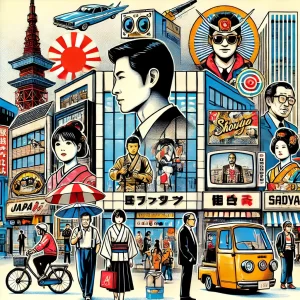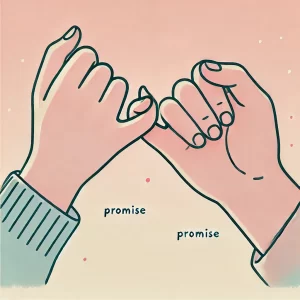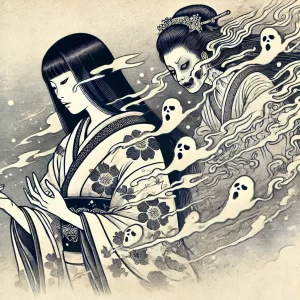死ぬのがいいわ [Shinu No Ga Ī Wa]
藤井風 [FUJII Kaze]
Words & Music : 藤井風 [FUJII Kaze]
Continuing from “Nan-Nan” yesterday, I’ll cover another song by FUJII Kaze. This song, included in his 1st album “HELP EVER HURT NEVER,” gained global attention when a Thai user on TikTok posted a 20-second video editing the footage of the TV anime “Jujutsu Kaisen wiki” with this song as the background music, which became very popular. As a result, it attracted worldwide attention. In 2022, Spotify announced that this song was ranked number one in the “most streamed Japanese artist’s songs outside of Japan.”
Now, let’s talk a little about the musical appeal of this song.
Fujii himself describes this song as having Shōwa-style lyrics and melody. “昭和 / Shōwa” refers to the period in Japan from 1926 to 1989, and while there is a wide variety of music from this era, in this context, it likely refers to old-fashioned Japanese music called “Shōwa-kayō.” Songs like “Blue Light Yokohama,” which I introduced earlier, are representative of Shōwa-kayō, but sometimes Shōwa-kayō is discussed together with “Enka” and other music that incorporates “Japanese-style” scales.
One of the “Japanese-style” scales is what in Western musical terms is called the major pentatonic scale. The melody at the beginning of this song gives the impression of using this “Japanese-style” scale. Furthermore, the chorus phrase sounds like another Japanese-style scale, the minor “yonanuki” scale. This scale is used in minor enka songs and “Kōjō no Tsuki,” and is a Western musical interpretation of Japan’s ancient “miyakobushi” scale.
This kind of Japanese-style melody combined with modern beats creates very interesting music. So, what about the lyrics makes them “昭和 / Shōwa”-like?

指切りげんまん ホラでも吹いたら
yubikiri genman hora demo fuitara
針でもなんでも 飲ませていただき Monday
hari demo nandemo nomasete itadaki Monday
It doesn’t matter if it’s Sunday
- 指(ゆび) [yubi] : finger
- ホラ(ほら) [hora] : bluff
- 針(はり) [hari] : needle
- 飲む(のむ) [nomu] : drink
(translation) “YUBIKIRI GENMAN” if I lie,
I’ll drink needles or whatever.
It doesn’t matter if it’s Sunday.
Do you know the “pinky swear”? It seems to be quite common in America and is a promise made by children that involves hooking each other’s pinky fingers. It is believed that this makes the promise more serious.
In fact, the origin of this practice is in Japan, and it’s called “Yubikiri Genman” here. Just like the “pinky swear,” you hook pinkies and sing a short song.
ゆびきりげんまん うそついたら はりせんぼん のます
yubikiri genman uso tsuitara hari senbon nomasu
It means if you lie, you’ll cut off your finger or swallow a thousand needles. It’s a scary song, lol.
This is a traditional song that has likely been around for centuries, and every Japanese person knows it. Here, it is slightly altered.

At the end of the second line, where it would normally be “いただきます / itadakimasu,” it becomes “いただきMonday / itadaki Monday.” Only the “Ma” part is the same, and the rest doesn’t mean anything. This kind of pun, when said by older men, is often called “オヤジギャグ / oyaji gyagu” (=dad joke, I found that the exact same word exists in English too!) and is considered annoying. People might say it’s very Shōwa-like. FUJII’s lyrics have the courage not to fear being uncool.
鏡よ鏡よ この世で1番
kagami yo kagami yo kono yo de ichiban
変わることのない 愛をくれるのは だれ
kawaru koto no nai ai o kureru no wa dare
No need to ask cause it’s my darling
- 鏡(かがみ) [kagami] : mirror
- この世(このよ) [kono yo] : this world
- 一番(いちばん) [ichiban] : best
- 変わる(かわる) [kawaru] : change
- 愛(あい) [ai] : love
- くれる [kureru] : give
- 誰(だれ) [dare] : who
(translation) Mirror, mirror, on the wall,
who gives the unchanging love?
No need to ask cause it’s my darling.
This is a parody of the queen’s line from Snow White.
わたしの最後はあなたがいい
watashi no saigo wa anata ga ii
あなたとこのままおサラバするより
anata to kono mama osaraba suru yori
死ぬのがいいわ
shinu no ga ii wa
死ぬのがいいわ
shinu no ga ii wa
- わたし [watashi] : I
- 最後(さいご) [saigo] : last
- あなた [anata] : you
- いい [ii] : good
- このまま [kono mama] : as it is
- おさらば [osaraba] : farewell
- 死ぬ(しぬ) [shinu] : die
(translation) I want my last to be with you.
Rather than parting with you as it is,
I’d rather die.
I’d rather die.
“さらば / saraba” means goodbye, and “おさらば / osaraba” is a colloquial term for farewell.
“死ぬのがいいわ / shinu no ga ii wa” means I’d rather die.
As I always say, you can read a lot into the use of first-person and second-person pronouns in Japanese. The first person is “わたし / watashi” and the second person is “あなた / anata,” so it seems to be written from a somewhat feminine perspective. Also, the “わ / wa” in “死ぬのがいいわ / shinu no ga ii wa” is a sentence-ending particle that expresses femininity.
三度の飯よりあんたがいいのよ
sando no meshi yori anta ga ii no yo
あんたとこのままおサラバするよか
anta to kono mama osaraba suru yoka
死ぬのがいいわ
shinu no ga ii wa
死ぬのがいいわ
shinu no ga ii wa
- 三度(さんど) [sando] : three times
- 飯(めし) [meshi] : meal
- あんた [anta] : you
(translation) I prefer you to three meals a day.
Rather than parting with you as it is,
I’d rather die.
I’d rather die.
“あなた / anata” has changed to the more casual “あんた / anta.” It’s rare to change within one song’s lyrics, but it happened in “Playback Part 2” as well.
“三度の飯より / sando no meshi yori” is an old-fashioned expression, and “よか / yoka” also sounds a bit old. It sounds like old Tokyo speech. Before Tokyo became Japan’s capital in 1868, the original Tokyo (called “Edo”) had somewhat rough language. It was also impatient and decisive.
Old songs and movie lines can be somewhat exaggerated and passionate, not just in Japan. This song has an old-fashioned feel like Shōwa-era hit songs, but it also has the elegance of Edo-period literature.
それでも時々 浮つくMy Heart
sore demo tokidoki uwatsuku My Heart
死んでも治らな治してみせます baby
shinde mo naorana naoshite misemasu baby
Yeah I ain’t nothin but ya baby
- うわつく [uwatsuku] : be frivolous
- 治る(なおる) [naoru] : heal
(translation) Still, sometimes my heart flutters.
If it doesn’t heal, I’ll fix it even if I die.
I ain’t nothin but ya baby.
“治らな / naorana” is a bit strange. It might be a dialect.
失って初めて気がつくなんて
ushinatte hajimete kigatsuku nante
そんなダサいこと もうしたないのよ Goodbye
sonna dasai koto mō shitanainoyo goodbye
Oh Don’t you ever say ByeBye
- 失う(うしなう) [ushinau] : lose
- 初めて(はじめて) [hajimete] : first time
- 気が付く(きがつく) [kigatsuku] : realize
- ダサい [dasai] : uncool
(translation) Realizing only after losing,
I don’t want to do such uncool things anymore. Goodbye.
Don’t you ever say ByeBye.
“したない / shitana” is a dialect.
“ダサい / dasai” means uncool. I use it often too.
わたしの最後はあなたがいい
watashi no saigo wa anata ga ii
あなたとこのままおサラバするより
anata to kono mama osaraba suru yori
死ぬのがいいわ
shinu no ga ii wa
死ぬのがいいわ
shinu no ga ii wa
三度の飯よりあんたがいいのよ
sando no meshi yori anta ga ii no yo
あんたとこのままおサラバするよか
anta to kono mama osaraba suru yoka
死ぬのがいいわ
shinu no ga ii wa
死ぬのがいいわ
shinu no ga ii wa
それでも時々浮つくMy Heart
sore demo tokidoki uwatsuku My Heart
そんなダサいのは もう要らないのよ byebye
sonna dasai no wa mō iranai no yo byebye
I’ll always stick wit ya my baby.
- 要る(いる) [iru] : need
(translation) Still, sometimes my heart flutters.
I don’t need such uncool things anymore. ByeBye.
I’ll always stick wit ya my baby.
Mixing Edo language and dialects, I’m not sure how aware FUJII himself is of it, but it felt not just old-fashioned but deeply nuanced. If this were Kabuki wiki, the woman would typically become a ghost after committing suicide.

Thanks for reading! Feel free to comment if you have any feedback or questions.
Follow me on X.



